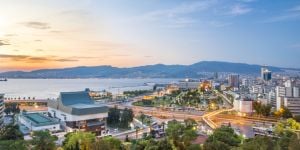
On June 12, 2020, Turkey lifted its border and travel restrictions, so you are free to travel there, regardless of the purpose of your stay. However, you should expect some changes in terms of entry requirements, visas, employment, as well as the cost of living, lifestyle, etc. Here are some tips to help you plan your post-COVID-19 move to Turkey.
What are the current regulations for entering Turkey?
Turkey lifted all restrictions on its land, air and sea borders on June 12, 2020. Regardless of your nationality, you are therefore allowed to travel to Turkey. Keep in mind, however, that the wearing of masks is compulsory from the moment you board a flight to Turkey, including at the airport. You also have to provide a location form -- which will be provided to you by your airline -- with your address in Turkey. On arrival, travellers have to undergo a temperature check and medical tests. Anyone with coughing and with fever has to undergo a COVID-19 PCR test. Positive COVID-19 cases are conducted by the Ministry of Health officials to a designated facility for a 14-days quarantine. If you prefer private health care, the costs are your responsibility. Find out more on the Ministry of Foreign Affairs website. Foreigners travelling to Turkey for medical reasons must be in possession of all documents relating to their health condition as well as a medical visa.
Have there been any visa changes recently?
Foreign nationals with expired visas and who remained stranded in Turkey during the border closure are exempt from overstay fees provided that they leave Turkey within a month following the reopening of the borders of their home country. Those who leave the country after October 11 are liable to administrative fines. Regarding foreign nationals with an expired visa and who do not leave the country before October 12, they will be temporarily banned from Turkey for a period depending on the number of days of overstay. For more information, visit the Directorate General of Migration Management website or the Ministry of Foreign Affairs website.
Is it easy to find work in Turkey following the crisis?
The Turkish labour market is more fragile today than ever. Official figures indicate that 82% of jobs are at risk. Moreover, more than 13 million job losses have been recorded since the start of the crisis, new employees being the most vulnerable. The unemployment rate thus rises to 13.2%, but it is expected to drop to 11.8% by the end of the year, until it reaches 9, 8% in 2022. Textiles and the manufacturing industry are the most significantly affected sectors, followed by tourism and services. Besides, 36% of employees have got wage cuts, which is considerably affecting their finances. However, more and more people are looking for part-time and freelance jobs. So if you're looking for a job in Turkey, you're out of luck for the time being.
How has the Turkish healthcare system performed during the crisis?
Turkey can boast of its universal health system. Thanks to the Sosyal Guvenlik Kurumu, citizens and residents of the country benefit from all types of health care free of charge. Turkey is home to well 928 well-equipped hospitals, 2,840 emergency stations, nearly 8,000 family health centres, 1,000 community health centres and some 5,500 ambulances, not to mention dental care centres and dialysis centres. Add to that more than 165,000 doctors, some 250,000 nurses and midwives, not to mention a surplus of 591,000 employees. So it's not surprising that Turkey performed well in the global struggle against the COVID-19 pandemic. It's also worth noting that 770 hospitals in Turkey are internationally accredited and welcome foreigners at affordable prices. During the crisis, there were 40 intensive care bed for every 100,000 people. Some 5,000 ventilation systems have also been manufactured locally, along with thousands of COVID-19 screening tests. In hospitals designated by the Ministry of Health, COVID-19 testing and treatment is provided free of charge, even for those who do not have health insurance. Thanks to massive investments in the health sector, Turkey now has 10 new hospitals with modern infrastructure and state-of-the-art equipment. Turkey also provided medical supply to countries like Italy, Spain, Great Britain, etc. According to the OECD, more than 70% of the population are satisfied with the health services provided in Turkey.
Has anything changed regarding universities and schools?
Most schools in Turkey are reopening on August 31, 2020, after several months of distance learning. A hygiene protocol has also been elaborated for the resumption of classes, including the compulsory wearing of face masks, temperature checks, regular hand sanitising and cleaning up of classrooms, as well as social distancing. Regarding higher education in Turkey, millions of students have already taken the national entrance exams. It's worth noting that Turkey is home to more than 150,000 international students. Since most activities are resuming gradually across the country, the new academic year should start smoothly.
How is the real estate market following the crisis?
Unlike other countries, the Turkish real estate market currently looks profitable for anyone who wants to invest in property. The drop in demand has led to a decrease in liquidity for real estate developers who, in turn, are being compelled to reduce prices on offer. Fluctuating exchange rates are also having a significant impact on property prices. Potential buyers have a profit margin of 20-25%. The number of real estate transactions went above 202,000 in June 2020, mainly due to the drop in the bank interest rates. In Ankara alone, more than 21,915 real estate deals were closed in June, followed by Izmir with 11,690 sales. According to TurkStat, 1,664 properties have been purchased by foreign nationals, most of them in Istanbul with 730 transactions made in June. If you are already in Turkey or are planning to relocate there very soon, you could seize the opportunity to become a homeowner.
Has the cost of living in Turkey changed because of the crisis?
Turkey is world-famous for its low cost of living. In fact, Istanbul is one of the world's cheapest cities with a cost of living that is 66% lower than New York and 53% lower compared to France. However, a slight price increase has been recorded in recent months, taking into account the inflation rate that rose from 10.94% to 11.39%. A monthly increase in consumer prices of around 0.92% is also expected. Prices of products and services, rents, alcoholic beverages and tobacco that have increased the most.
How about lifestyle? Have there been major changes in habits following the sanitary crisis?
Life in Turkey is going back to normal since the lifting of border and travel restrictions. Offices have reopened, and most employees have returned to work. The nurseries and nurseries have also reopened. However, most people are paying particular attention to hand sanitising, social distancing, as well as the wearing of masks, which is mandatory in all public places across the country. Note that it is also compulsory to wear a mask in the car when there are two people travelling. Failing to comply with this rule is liable to a fine of 900 Turkish liras in 54 provinces! On the other hand, people aged over 65 are only allowed to go out between 10 a.m. and 8 p.m. With the "normalisation", cafes and restaurants are open during certain hours, as are swimming pools and parks, in order to avoid large crowds. Even though sports activities and picnics are now allowed, and beaches are accessible, people are going out less than before.
We do our best to provide accurate and up to date information. However, if you have noticed any inaccuracies in this article, please let us know in the comments section below.











